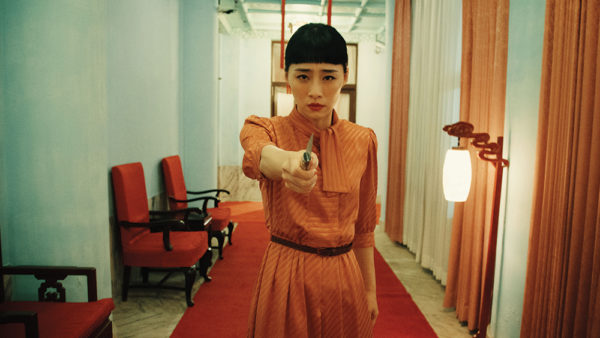
Terry and Joe tackle director Midi Z’s sumptuous Taiwanese psychological thriller, Nina Wu.
Plot: After toiling for years in bit-parts, aspiring actress Nina Wu (Ke-Xi Wu) finally gets her big break with a leading role in a spy thriller. The part, which calls for nudity and explicit sex scenes, is challenging and takes a mental and emotional toll that is exacerbated when she must return home following a family emergency.
Soon Nina begins to suffer paranoid fantasies about a mysterious woman (Kimi Hsia) who is stalking and attacking her. Is Nina losing her mind or is she actually in danger?
Non-Spoiler Review…
JOE
It’s rote to compare Nina Wu to the work of David Lynch, but I couldn’t shake the Mulholland Drive vibes I had when watching Midi Z’s film. Both Nina Wu and Mulholland Drive use a hallucinatory descent into madness to critique the damaging effects of sexism and abuse in the entertainment industry.
In many ways Nina Wu is a confronting film. It uses dream logic and temporal discontinuities to tell its narrative and its protagonist is increasingly revealed to be unreliable as the film progresses. For some audiences, this will be a challenge; the film isn’t afraid to deviate from normal conventions and while there is clarity in its final moments about what we’ve been watching, there’s also a refusal to simplify or guide audiences.
Things begin simply enough as we’re introduced to Nina Wu and follow her routine. She takes the train, she cooks a simple dinner in her small Taipei apartment and she webcams for fans in the evenings. Right from the start there’s a disconnect in her quiet, almost melancholy regular life and the more outgoing, dressed-up performance she delivers on camera; it speaks not only to the way she comes alive when she’s acting, but also that her “real life” is mundane, even sad.
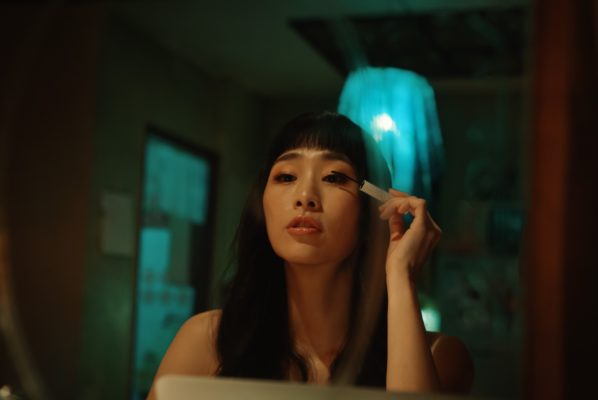
Things change when her long time agent Mark (Jen Shuo Cheng) secures her an audition for a juicy role in a film. It’s a significant step-up from her usual gigs as an extra in short films and commercials and, once again, it’s evident how talented Nina is as she passes through the auditions (first for a PA, then for a table full of men).
The film has barely begun when Midi Z and Wu’s script begins to play with time and logic. Nina is seen dragging a suitcase and then laying down in the middle of the street, visibly upset, and it’s not until the director (Lee-zen Lee) yells cut that it is revealed this is a scene from the film. Importantly, though, this coincides with the first instance of Nina’s trauma manifesting as she’s nearly run over by a car that no one else in the production appears to notice.
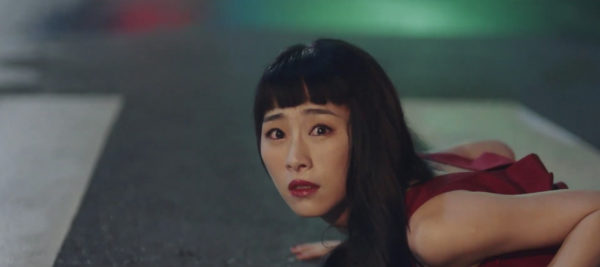
It’s an exceedingly clever and risky directorial choice by Midi Z. While much of the film is heavily stylized, including the production design, costuming and lighting of Nina’s red-tinged nightmares, there’s often no visual signifier to denote the shift from reality to fantasy and back for audiences. This requires viewers to pay close attention and maintains a level of inauthenticity that propels the mystery of just what is and has happened to Nina.
The blurring of film, reality and hallucination progresses throughout the film, with a bit of a lag when Nina is called home to call for her ailing mother and her struggling father. The scenes back in the country are vital for understanding Nina’s character, including her humble origins acting in a regional children’s production of The Little Prince and the introduction of the mysterious Kiki (Vivian Sung), who Nina repeatedly calls throughout the first half of the film.
The issue is that these low-key scenes with her family, while instrumental in providing backstory and planting crucial details for the film’s end, feel like a lull. The film is at its most fascinating and engaging when Nina is on set and dealing with her newfound celebrity, while the pacing feels glacial when she’s back home.
Terry, what are your overall non-spoilery thoughts on the film? Did the pacing work for you? And how did you feel about the amazing slooooow dolly shots by cinematographer Florian Zinke?
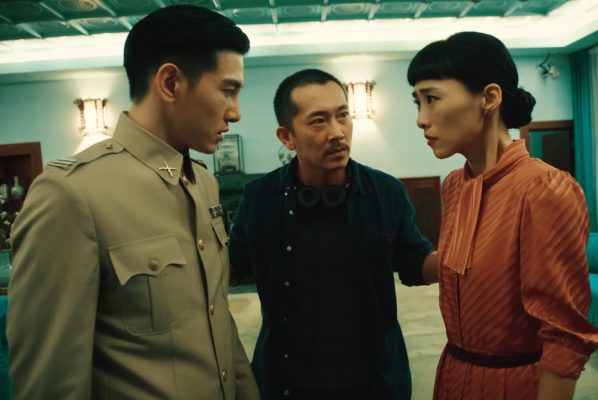
TERRY
Nina Wu is a film that probably benefits from repeat viewings because of the way it infuses visual motifs and sonic choices that continue to repeat throughout the entirety of the film. In a close-up scene in the beginning, Nina is shown in her quiet and subdued apartment and Zinke focuses on a pot of boiling water with some unknown meat simmering under the bubbles. The sound of boiling water becomes a pronounced pattern throughout Nina Wu, to the point that it sounds like a geiger counter in a few of the more surreal sequences. It’s a tension that’s constantly bubbling under the surface and an aural cue that is paid off towards the end.
Likewise, the use of dual images creates a maddening symmetry to the film, such as Nina passing the mysterious woman in a haunting hallway of hotel doors, the two pausing to look back at each other with an indiscernible look. Nina Wu is partially a film within a film and the movie Nina stars in brings to mind the behind-the-scenes trauma and torture that Stanley Kubrick put Shelley Duvall through in The Shining. The way this inner movie is filmed also evokes The Shining’s rich set decoration and powerful cinematography.
In one of the early powerful moments, Nina is filmed in a long take angrily shouting at her on-screen lover and then retreating, sometimes with a knife pointed at her lover and sometimes pressed against her throat. It’s a long-take that moves from a film into “real life” when Nina is viciously slapped by the director to “encourage” her to be more emotional. Moments like this explore that film/real life dichotomy between actors and directors incredibly well, blurring the lines between the fantasy of film and the reality of the actors.

This distinction continues to blur, though, as the film continues. A sequence on a boat, for example, seems to start as a scene in the movie Nina is shooting that’s interrupted by police, only for it to continue with an explosion that sends her, bloodied and bruised, into the water. And while we watch her struggle on the surface, an open wound on her forehead oozing blood down her stricken face, credits roll on the screen, confirming that this is actually another scene from the film.
Nina Wu questions that line between performance and reality: was this bloody sequence staged? Was it happenstance that the real world affected the filming and her reactions were caught and then used by the director?
As we follow Nina post-film, her world becomes increasingly fractured and, as you mentioned, Joe, she becomes increasingly unreliable as a narrator and a witness. When she returns home and meets her childhood friend, Nina Wu embraces its Lynchian desires by continuing to confuse the viewer. Scenes sometimes feel out of order and the line between dreams and reality is stretched to the breaking point. The pacing here does suffer as a result, even though the scenes between Nina and Kiki are fantastic and an important tonal distinction from the rest of the film.
Nina Wu is at its strongest when it explores the divide between film and reality, particularly when it focuses its derision on directors and their responsibility to their actors. As the film spirals to its fated conclusion, it sharply critiques the way the film industry uses and abuses women. It happens at all angles.
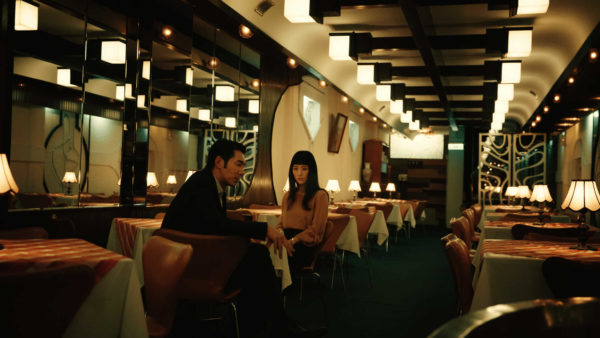
In one of the early scenes Nina’s agent pushes her to accept a film with full frontal nudity and an explicit sex scene. He begins by reminding her that she hasn’t had a film acting role in the six years he’s represented her. He then lays out the explicit content, but quickly demeans her by saying, “if you’re uncomfortable with it, don’t even try for it.” Then follows that up with: “the key thing is how you feel about it,” knowing full well that that isn’t what he’s worried about. It’s passive aggressive at its worst, blaming Nina for not being in a film and then dismissively egging her to do it.
A lot is going on here, Joe. And as I stated, I do think Nina Wu is a film I would grow to appreciate on a second watch because of how hazy it is and the way director Midi Z foreshadows Nina’s trauma. So let’s dig into that and explore how Nina Wu stages the character’s trauma. I’m curious about your thoughts regarding Kiki, the reveal of the visual/aural motifs and your thoughts on the way the film ends.
Spoilers for the film follow…

JOE
Now it’s time to delve into spoilers where we can actually discuss just what the hell Nina Wu is doing, which is vital because the whole film is oriented around its ending.
It’s important to note that star Wu co-wrote the script with Midi Z, so there’s a good chance that many of the “on set” and audition sequences are based on real life events. The horrors of the casting couch and the treatment of female stars by their male directors is part of a long, storied tradition that dates back to the origin of cinema, so Nina Wu isn’t breaking new ground so much as confirming the sad reality that these issues remain a persistent problem.
At the end of the film, it is revealed that Nina’s hallucinatory experiences involving No. 3 (Kimi Hsia) are the result of her repressed memories of being raped by the film’s producer. Initially it appears as though Nina and #3 became involved when a line-up of women auditioned for the lead role, but the end of the film reveals that that is merely another element of Nina’s repression and she simply saw No. 3’s headshot in the room before her assault.
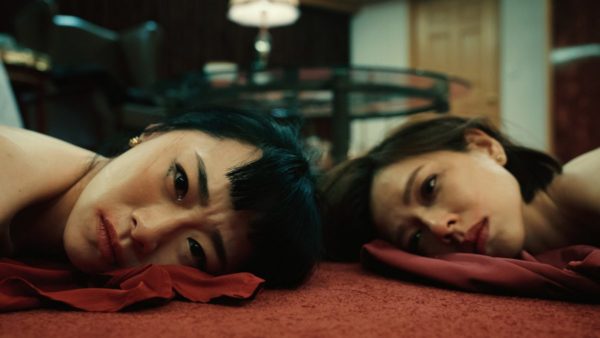
The ending doesn’t sit well with me: by closing Nina Wu with the rape, the trauma is treated as a revelatory “twist”. This may be Midi K and Wu’s intention – to remove any sense of catharsis or resolution – but it plays as more sensational than confronting. In short: it left a bad taste in my mouth, as though the confirmation of a sexual assault clarifies or resolves everything that has come before.
This ties into the way that Nina and Kiki’s relationship unfolds. When Nina is home, the audience is offered insight into the sacrifices that she made when she moved to Taipei to pursue her dreams. Nina left behind not just her family and her small town, but a true love who didn’t have the same kind of drive and ambition.
The conflation – or intersection – of No. 3 into Nina’s brief reconciliation with Kiki is fascinating. Knowing that Nina is queer cues the audience to read Nina’s interactions with women differently, and No. 3 frequently appears in moments when Nina is sexually vulnerable (at the clinic; when she’s following Kiki down the street, etc).
There’s a heavy dose of repression when Nina is back home since she’s clearly not “out”. In this sense the visual iconography of the doubling works well: No. 3 is not only symptomatic of Nina’s repressed trauma, but also her repressed sexuality.
Consider the moment where she’s driving the moped and she’s thrown to the ground by the parade of men who point at her and say “the god sees an evil spirit.” Is this a reference to the spectre of #3 that Nina is haunted by? Is it reflective of the unwelcoming homophobia of the rural community? Or is it a condemnation of how Nina has repressed her sexuality and lied to herself about who she is in order to make it as an actress?
While the commentary on the film industry and the blurred lines between fantasy and reality on the film set are by far the most engrossing part of the film, there’s still a lot of intriguing work occurring in these smaller moments. You’re right, Terry, that these quieter moments, which offer so much insight into Nina’s background, will likely play better on a rewatch when the mystery of #3 isn’t hanging over the proceedings.

It’s challenging because so much of the dynamic cinematography and the visual trickery occurs in the moments when we’re on set with Nina. Scenes like the repeated takes of the dinner scene with that slow pull-back dolly, as well as the long-take scene with the knife, are exquisite and captivating. Those are the moments that have cemented in my memory since my initial watch.
All in all, Nina Wu is a captivating and mysterious film that works best when it is tackling the systemic sexism and abuse in the film industry. Despite a challenging and divisive ending, Ke-Xi Wu’s stellar lead performance and Florian Zinke’s cinematography alone make this worth a recommendation. Grade: B
Terry, what is your take on the end of the film and No. 3? What did you think of Wu’s performance as Nina? And what is your final grade?
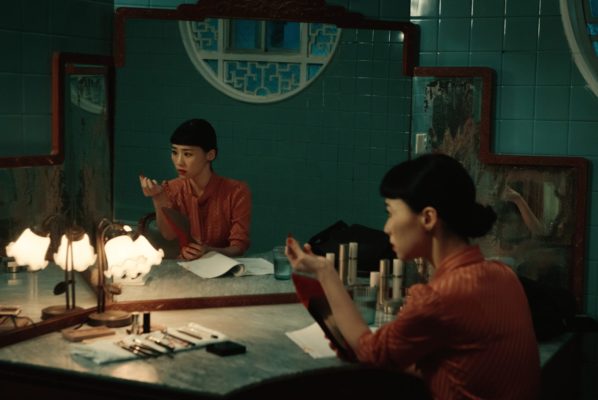
TERRY
This is the part I’ve actually been dreading talking about, Joe, because Nina Wu is a lot. As I mentioned above, it’s a film that almost requires a second viewing; it’s challenging to fully appreciate the way Midi Z and Ke-Xi Wu have constructed both the script and the film on a first watch.
It’s here that I’ll admit I didn’t realize until you wrote about it above that No. 3 is the woman Nina kept seeing. I knew she featured in the scene at the spa and the ending revelations, but I did not pick up the way she was a constant spectre in Wu’s life. That, coupled with the auditory and visual motifs, heightens Nina Wu in ways that I wasn’t expecting.
Honestly, I didn’t like the film when I first finished watching it because the finale left such a bad taste in my mouth. You’re absolutely right that the way it unfolds feels like a “twist” ending. It’s weird because I already knew going into the film that it was about sexual assault and how the film industry commodifies women’s bodies.
Reaching the ending felt doubly gross because the last image we’re left with is her fear and horror and humiliation. It’s frustrating because it denies catharsis in ways that the rape revenge genre often allows, but that’s not the movie that Ke-Xi Wu wanted to write. That’s not the way it works in the real world, unfortunately. It’s absolutely a deliberate choice to end in a way that forces the viewer to confront the horror that’s merely talked around for the rest of the film. And if it weren’t for the fact it was co-written by Ke-Xi Wu, based on some of her experiences, I would have more easily written it off.

Actually, Nina Wu feels more nuanced in its discussion of sexual assault and the pall it can cast on the survivors than I expected. Mostly because of the mysterious No. 3 and the obvious guilt that Nina Wu deals with, post-assault. That knowledge that she got the part over a number of women and the realization of why she got the part is heartbreaking.
The way Nina Wu explores that dichotomy, particularly in the vicious way it’s thrown at the titular character (“You know why you got the role!”) is horrendous. It’s also a triggering reminder that will live with her for the rest of her life. Not only was Nina’s dignity and humanity stripped from her, but her success will be a constant reminder of how she was degraded.
It’s a heavy and rough subject, Joe.
It’s also probably why the ending feels so grotesque: the film wants us, the viewer, to realize and see it. So in that regard, I suppose it’s successful.

What’s undeniable, though, is Ke-Xi Wu’s performance as Nina Wu. Goddamn was she awe-inspiring.
She commands the screen and the film (and the film within the film) is gruelling because of the performance she gives. Her emotional journey changes on a dime in so many scenes (once again: consider how she transitions from vulnerability to powerful agency to fear to sorrow in the long-take of her holding the knife). The way the film constantly moves from real life to “reel life” and back works primarily because of Wu’s performance and her ability to make us fear for her.
Ke-Xi Wu gives a powerhouse performance that’s filled with nuance and that’s ultimately what I’m going to remember about Nina Wu.
Even if I’m unsure how to think about the ending, her performance is enough for me to give Nina Wu at least a B+ on first viewing.
Nina Wu is now available on VOD and DVD